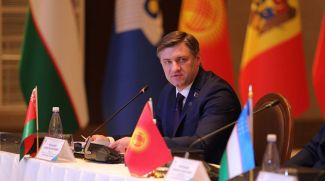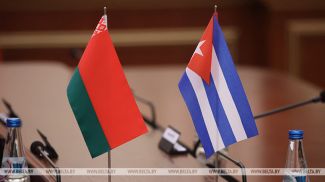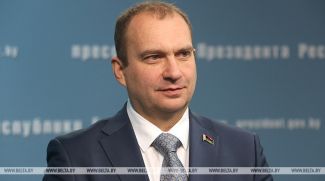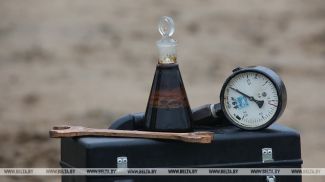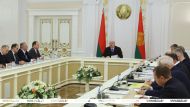MINSK, 24 March (BelTA) – Prime Minister of Belarus Sergei Rumas visited the Izotop enterprise based in Starobin, Soligorsk District, Minsk Oblast on 24 March, BelTA has learned.
The enterprise has been present on the Belarusian market for a long time. But it suspended operations in 2015-2018. Operations were resumed in late 2019. Now it uses meltblown fiber to make respirators that offer class 2 protection. Izotop can make about 100,000 respirators per month but additional equipment is being installed to help increase the output to 180,000 respirators per month. Apart from that, the enterprise will get a machine tool within several weeks in order to make masks. It will allow Izotop to make about 150,000 of them per day.
Sergei Rumas told media that Belarus is well-supplied with class 2 and class 3 respirators as well as medical masks. “But we have to import some of these medical products. The main goal [of the trip to Starobin] is to understand what the enterprise needs in order to make more respirators and fully satisfy Belarus' demand for this kind of medical products,” the prime minister said. The respirators will be primarily intended to protect medics.
Respirator production in Belarus has stumbled over one problem: it is now difficult for the enterprise to purchase the raw material, which used to come from Ukraine and China. Demand for meltblown fiber has skyrocketed, with the price per 1kg going up from €5 to €50.
The Belarusian enterprise is in negotiations with partners in Russia in order to purchase equipment to make meltblown fiber. The possibility of starting the production of meltblown fiber or a similar fiber in Belarus is also under consideration. For instance, SvetlogorskKhimvolokno Company specializes in making such fibers. The company has already made test materials for respirators. But the effectiveness of this kind of filtering fiber has not been verified yet. Belarus has no labs able to confirm the quality of personal protective gear for medics. They have yet to be set up.
There are certified labs in Russia, Armenia, and Kazakhstan but they have a backlog of orders and getting the Belarusian fiber certified may take months. The ability of the Belarusian fiber to filter out bacteria can be tested in China but even this option will take several weeks to get official results.
Sergei Rumas said: “The Healthcare Ministry will organize the certification of this product soon. If it meets all the necessary parameters, it will be used to make respirators.”
In his words, an enterprise of the State Military Industrial Committee of Belarus may start making class 3 respirators. The enterprise is now in negotiations on equipment acquisition with Chinese partners.
After visiting the Izotop enterprise Prime Minister of Belarus Sergei Rumas decided to find out whether a local drugstore is well-supplied with masks and sanitizers. Healthcare Minister Vladimir Karanik accompanied him. It turned out the Starobin drugstore has about 100 gauze masks in stock, down from 200 a week ago. Several kinds of antiseptic drugs were also available for sale.
On the way to Minsk the government officials dropped in at a drugstore in Soligorsk. The drugstore had no masks in stock. The pharmacist said they had had none for several days. In her words, the drugstore chain has ordered some from the Belarusian state light industry concern Bellegprom but there has been no response so far. The prime minister promised to look into the matter.
Later on Sergei Rumas told reporters that the Healthcare Ministry had been instructed to keep an eye on the availability of masks in drugstores. “As of this morning there were 380,000 masks in Bellegprom warehouses. We make about 250,000 masks per day. The amount is sufficient for fully satisfying the domestic demand,” Sergei Rumas stated.
BelTA reported earlier that during the government conference held on 19 March to discuss the epidemiological situation in the country Belarus President Aleksandr Lukashenko remarked that the country has sufficient amounts of protective suits, masks, and disinfectants. However, no respirators are made in Belarus.
Healthcare Minister Vladimir Karanik brought a respirator to the conference specifically to demonstrate it to the head of state. In turn, Aleksandr Lukashenko instructed to hand over the sample to the government and start manufacturing respirators within one week.




